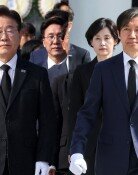Most world cities are highly polluted, WHO says
Most world cities are highly polluted, WHO says
Posted May. 09, 2014 05:48,
Air quality in most cities around the world fails to meet the guidelines of the World Health Organization for safe levels. The WHO announced on Wednesday that its study on air quality covering 1,600 cities across 91 countries revealed that most cities are polluted and pose health risks.
The particulate matter is categorized into PM10, which refers to particles less than 10 micrometers (a micrometer is one-millionth meter) in diameter and PM2.5 referring to those less than 2.5 micrometers in diameter. According to the WHO guidelines, PM10 is 20 micrograms (one microgram is one-millionth gram) per cubic meter of air volume and PM2.5 is less than 10 micrograms per cubic meter.
The WHO said only 12 percent of the people living in cities where this complies with its guideline levels, and half of the urban population is exposed to air pollution that is 2.5 times higher than the levels WHO recommends. The organization said this puts people at risk of serious, long-term health problems. Many factors contribute to urban pollution including reliance on fossil fuels such as coal fired power plants, dependence on private transport motor vehicles, inefficient use of energy in buildings and the use of biomass for cooking.
Cities with high pollution levels included cities in emerging countries in Asia, the Middle East, Latin America, and Africa. Cities in high income countries such as Canada, the U.S., New Zealand, and Australia had slightly higher levels of pollution than the guideline level.
Among the most polluted cities in Asia were New Delhi in India, Karachi in Pakistan, Dacca in Bangladesh, and Beijing in China. Most polluted cities in the Middle East were Abu Dhabi in the UAE, Doha in Qatar, and Cairo in Egypt. Seoul was relatively highly polluted with a ranking of around 500th out of 1,600 cities in the world. Koreas guideline level of PM 2.5 is 25 micrograms per cubic meter.
Among cities with high levels of pollution were Mexico City in Mexico and Rio de Janeiro in Brazil in South America, Dakar in Senegal and Accra in Ghana in Africa, and Ankara in Turkey and Sofia in Bulgaria in Europe.
Headline News
- Israel prepares for retaliation against Iran
- Samsung reclaims top spot, surpassing Apple in smartphone market
- 77% of Koreans in 20s and 30s are 'Kangaroo Tribe' due to job crisis
- KBO referees embroiled in controversy over ABS decision concealment
- Inflation, oil price surge put double shock on global economy







